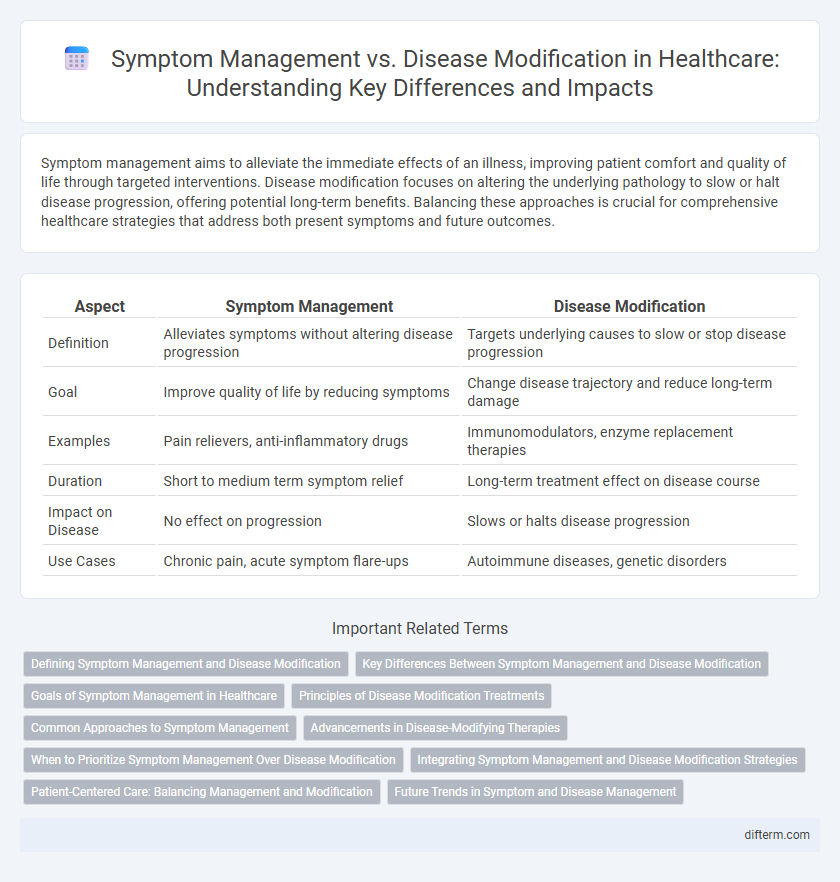Symptom management aims to alleviate the immediate effects of an illness, improving patient comfort and quality of life through targeted interventions. Disease modification focuses on altering the underlying pathology to slow or halt disease progression, offering potential long-term benefits. Balancing these approaches is crucial for comprehensive healthcare strategies that address both present symptoms and future outcomes.
Table of Comparison
| Aspect | Symptom Management | Disease Modification |
|---|---|---|
| Definition | Alleviates symptoms without altering disease progression | Targets underlying causes to slow or stop disease progression |
| Goal | Improve quality of life by reducing symptoms | Change disease trajectory and reduce long-term damage |
| Examples | Pain relievers, anti-inflammatory drugs | Immunomodulators, enzyme replacement therapies |
| Duration | Short to medium term symptom relief | Long-term treatment effect on disease course |
| Impact on Disease | No effect on progression | Slows or halts disease progression |
| Use Cases | Chronic pain, acute symptom flare-ups | Autoimmune diseases, genetic disorders |
Defining Symptom Management and Disease Modification
Symptom management focuses on alleviating or controlling the signs and discomfort caused by a medical condition, aiming to improve a patient's quality of life without necessarily addressing the underlying cause. Disease modification targets the root biological mechanisms to slow, halt, or reverse the progression of a disease, potentially altering its natural course. Effective healthcare strategies often integrate symptom management and disease modification to provide comprehensive patient care.
Key Differences Between Symptom Management and Disease Modification
Symptom management targets alleviating the immediate signs and discomforts of a condition, such as pain relief or reducing inflammation, without altering the underlying disease process. Disease modification aims to change the course of the disease by slowing, halting, or reversing its progression, often through targeted therapies addressing the root cause. Key differences include the focus of treatment outcomes--symptom control versus long-term disease impact--and the potential for improved prognosis with disease-modifying interventions.
Goals of Symptom Management in Healthcare
Symptom management in healthcare aims to alleviate pain, reduce discomfort, and improve quality of life without necessarily altering the underlying disease process. It focuses on controlling symptoms such as fatigue, nausea, and anxiety to enhance daily functioning and patient well-being. Effective symptom management supports adherence to treatment plans and addresses psychosocial aspects of illness.
Principles of Disease Modification Treatments
Disease modification treatments target the underlying pathophysiology of chronic illnesses to slow, halt, or reverse disease progression rather than merely alleviating symptoms. These therapies often involve interventions such as biologics, small molecule inhibitors, or lifestyle modifications designed to alter disease mechanisms at the molecular or cellular level. Effective disease modification requires early diagnosis, personalized treatment plans, and ongoing monitoring to optimize long-term patient outcomes and reduce complications.
Common Approaches to Symptom Management
Common approaches to symptom management include pharmacological treatments such as analgesics and anti-inflammatory drugs, physical therapy to improve mobility, and lifestyle modifications like diet and exercise to reduce symptom severity. Non-pharmacological methods such as cognitive-behavioral therapy and acupuncture are also widely utilized for chronic pain and stress-related symptoms. These strategies aim to improve patient quality of life by alleviating discomfort without altering the underlying disease process.
Advancements in Disease-Modifying Therapies
Recent advancements in disease-modifying therapies (DMTs) have transformed the treatment landscape by targeting the underlying mechanisms of chronic illnesses such as multiple sclerosis, rheumatoid arthritis, and Alzheimer's disease. These therapies aim to slow or halt disease progression, contrasting with symptom management strategies that primarily address clinical manifestations without altering disease course. Innovations in biologics, small molecule inhibitors, and gene therapies have significantly improved patient outcomes by reducing inflammation, preventing tissue damage, and enhancing long-term quality of life.
When to Prioritize Symptom Management Over Disease Modification
Prioritize symptom management over disease modification when immediate relief and quality of life improvement are critical, especially in chronic or advanced conditions where disease progression is irreversible. Focus on alleviating pain, fatigue, or other debilitating symptoms to enhance daily functioning and patient comfort. This approach is essential when disease-modifying therapies have limited efficacy, delayed onset, or significant side effects.
Integrating Symptom Management and Disease Modification Strategies
Effective health care requires integrating symptom management and disease modification strategies to improve patient outcomes and quality of life. Symptom management focuses on alleviating immediate discomfort, while disease modification aims to slow or halt disease progression, making a combined approach essential for chronic conditions such as rheumatoid arthritis and multiple sclerosis. Tailored treatment plans incorporating pharmacologic and non-pharmacologic interventions optimize both symptomatic relief and long-term disease control.
Patient-Centered Care: Balancing Management and Modification
Symptom management prioritizes alleviating patient discomfort and improving daily functioning, while disease modification targets the underlying causes to alter disease progression. Effective patient-centered care balances these approaches by tailoring treatment plans to individual needs, preferences, and quality of life goals. Integrating symptom relief with strategies that slow or reverse disease advancement enhances overall patient outcomes and satisfaction.
Future Trends in Symptom and Disease Management
Emerging technologies in health are driving the shift from solely symptom management to integrated disease modification, leveraging precision medicine and gene editing tools like CRISPR to target underlying causes at the molecular level. Advanced biomarkers and AI-powered predictive analytics enable personalized treatment plans that not only alleviate symptoms but also slow or reverse disease progression in conditions such as cancer, neurodegenerative disorders, and autoimmune diseases. Continued innovation in drug delivery systems, immunotherapy, and digital health monitoring promises more effective, patient-centered approaches that transform chronic disease management moving forward.
Symptom management vs Disease modification Infographic

 difterm.com
difterm.com